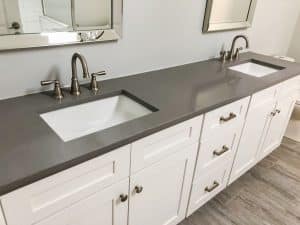
Quartz countertops are a popular feature in modern homes because they are stylish yet hold up well against scuffs and stains. Unlike other types of stone countertops, such as granite or marble, quartz countertops are engineered. In other words, while granite countertops are cut from a larger piece of granite that was formed by nature, quartz countertops are compiled from smaller parts by humans.
While many understand the benefits of quartz countertops, few understand how quartz countertops are actually made. Here is a look at the process of how these useful kitchen features are created from start to finish.
What is Quartz?
Quartz is a naturally occurring mineral found beneath the earth’s surface. It’s an igneous rock made up of primarily oxygen and silicon atoms, and it’s commonly found in the earth’s continental crust. It’s a common mineral that is mined all over the world, especially in places like the Alps, Japan, Brazil, Madagascar, Arkansas, and upstate New York. The mineral is used in a variety of common products, including glass, ceramics, jewelry, and of course, countertops. There are also several different varieties of quartz, such as amethyst, ametrine, rose quartz, carnelian, onyx, jasper, and agate.
What Are Quartz Countertops Composed Of?
Raw quartz is extracted from the Earth and then combined with other materials to create the product actually used in the building process. The mixture is typically about 90%–95% raw quartz combined with polymer resins, pigments, and other additives that give the stone the quality manufacturers are looking for. The exact ratio and materials used in the process depend on the brand, but it’s typically at least 90% raw quartz.
How Are Quartz and Resin Combined into a Solid Composite Material?
The quartz is processed into a useable building material through the following steps:
- Quartz is combined with additives such as polymer resins, pigments, and other additives.
- The mixture is put under intense amounts of pressure to form quartz slabs.
- The slabs are cured in a kiln, and a finish is applied to give it a polished appearance.
The raw quartz and the additives are typically put under intense pressure for about 100 seconds until it becomes nonporous, meaning liquids cannot penetrate the material. This is especially important for countertop manufacturing because no one wants to spill something in the kitchen, only to have it seep through into their cabinets. The intense pressure creates quartz slabs, which are then treated with a finish to make them look more appealing and resistant to damage. The finish is applied, and then the slabs are put in a kiln at temperatures around 85 degrees for about half an hour. Once they come out of the kiln, they are ready to be shipped out for installation. If you are remodeling your kitchen or building a home in Dallas/Fort Worth and you’re interested in installing brand new quartz countertops, come see us at Wholesale Granite Direct. We offer all kinds of discounts, special financing, and high-quality building materials that you won’t find anywhere else. If you are in the market for gorgeous quartz countertops that are built to last, we offer unique designs at a price you won’t believe.

